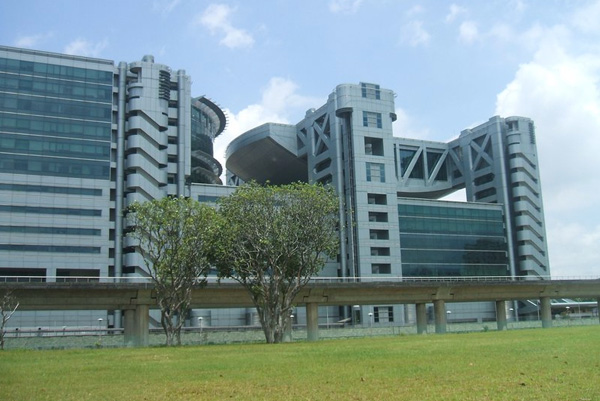Affordances and reinforcement contingencies by the government to promote environmental sustainability, in terms of providing funding and awarding recognition, encouraged companies to weigh sustainability as a more cost-efficient option, improving profit margin. Largely, government support has been an influential factor in encouraging companies in Singapore to be more environmentally sustainable.
With numerous incentive programs and funding schemes to encourage a more green corporate culture in Singapore, companies are spoilt for choice. The government thus plays a great role in scaffolding the pain of extra costs for the company, making efforts towards being green easier and more attractive. Listed below are some examples, to meet the specific needs of different companies.
Design for Efficiency Scheme (DfE) by National Environment Agency (NEA)
 (Singapore Post office at Paya Lebar, energy-efficient cooling units)
(Singapore Post office at Paya Lebar, energy-efficient cooling units)
Target: Companies which are going to have new facilities
DfE aims to encourage new facilities that are large consumers of energy to integrate energy and resource efficiency improvements into their development plans early in the design stage. Funding is provided up to 80% of the qualifying costs or $600,000, whichever is lower.
Skyrise Greenery Incentive Scheme by National Parks (NParks)
 (Changi Airport Terminal 3, the Green Wall)
(Changi Airport Terminal 3, the Green Wall)
Target: Companies wanting more greenery on location
The SGIS encourages the installation of skyrise greenery on existing residential and non-residential buildings in Singapore. Funding is provided up to 50% of the cost of installation of green roofs and vertical greenery.
A*STAR-MND Joint Grant Call by Building and Construction Authority (BCA), Agency for Science, Technology and Research (A*STAR), and Ministry of National Development (MND)
Target: Companies interested in R&D collaboration
The grant is a call for proposals in green building technologies. This is open to researchers in all local public sector research organisations, universities, polytechnics, A*STAR-funded research institutes and centres, and Singapore-based companies. Each project should have at least one industry partner as its co-investigator to encourage R&D collaboration between research organisations and private companies.
Hence, by providing generous funding to incentivize sustainable measures, the government is using the Elaboration Likelihood Model of Persuasion to implant the norm of sustainable development among companies in Singapore. The government entices companies firstly via the cost-effective aspect, as companies are very sensitive to cost changes. The government clearly communicates its pro-sustainable stance by appreciating the efforts of individual companies and awarding recognition through awards (eg: BCA Green Mark awards). As more and more companies undertake sustainable measures so as to compete with one another, the social norm among companies would shift accordingly to be more environmental friendly. The government has been aware of the varying needs of different companies in different stages of sustainable development and hence the many different schemes and incentives available.
Areas for improvement
Based on the Stages of Change model, the government can increase awareness of the sentiment of each company towards environmental sustainability via improved communication and monitoring. Then the government can provide more targeted measures to meet the unique individual needs of the company. For example, if a company is at the contemplation stage and is ambivalent about changing to be more environmentally sustainable, the government can encourage consideration for change by providing evidence of benefits enjoyed by other companies which have made the switch.
